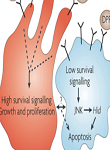|
|
|
Cell Competition: Advances & mechanisms
|
|
|
|
|
|
|
|
|
|

|
|
|
|
Abhijit Kale, PhD
|
|
|
|
Buck Institute for Research on Aging
|
|
8001 Redwood Blvd. Novato, CA 94945, USA
|
|
akale@buckinstitute.org
|
|
|
|
|
|
|
|
|
|

|
|
Cellular communication is an important process for animal development, which guides cell fate specification and the movement of cells within and between tissues. During growth, cell-cell communication plays a critical role in decisions that determine whether cells survive to contribute to the organism. Cell competition is one such remarkable phenomenon that is conserved from invertebrate to mammals, that causes the elimination of relatively less fit cells from tissues, helping to maintain overall tissue health. Cell competition is not only functional during development but it also replaces less fit cells in adult tissues. This suggests that the properties of individual cells are monitored and that variant clones of progenitor cells can be favored or eliminated accordingly. Progress has been made in recent years to understand the mechanisms of cell competition by several approaches but still much remains to be learned. Cell competition has been implicated in regenerative medicine, cancer and aging. It was assumed that molecular signals between cells are necessary and sufficient for cell competition. However, recent reports illustrate an interesting mechanism that has been previously speculated but never proven. In this review, we will discuss the process of cell competition and its’ implications and mechanisms.
|
|
|
|
|
|
|
|

|
|